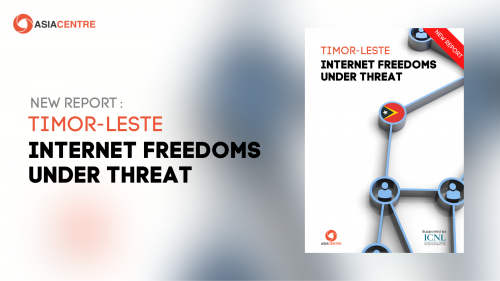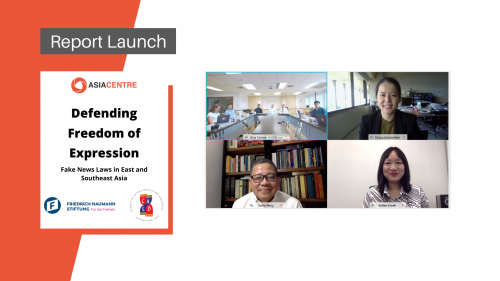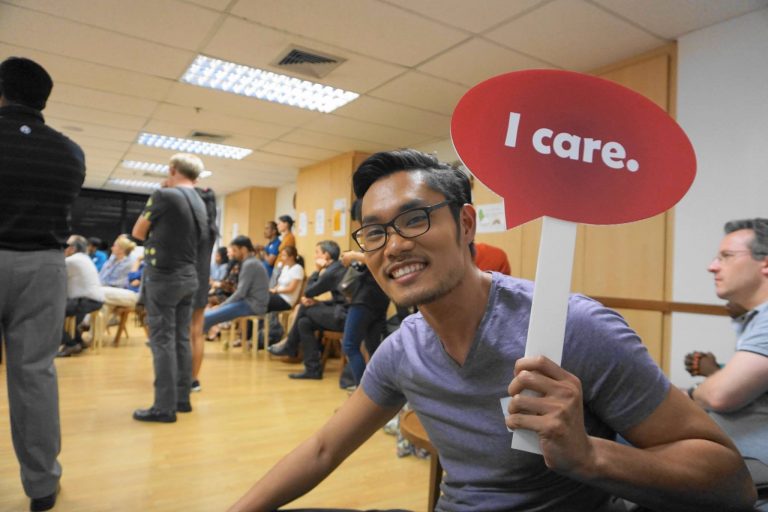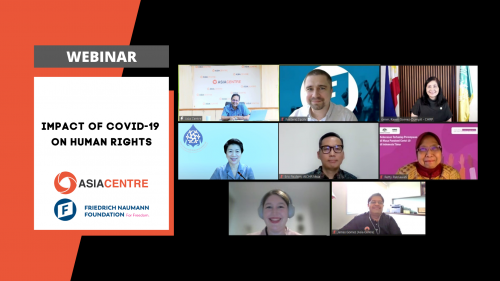
Commissioners from different human rights bodies highlighted that during the pandemic, women disportionately faced various challenges. Despite the operational difficulties, the various commissions nevertheless have tried their level best to call out these COVID-19 related rights violations.
 Officiated by Frederic Spohr, Head of Friedrich Naumann Foundation in Thailand and Myanmar, these and other issues were highlighted during the International Human Rights Day Roundtable Discussion ‘Impacts of COVID-19 on Human Rights’ on 9 December 2021.
Officiated by Frederic Spohr, Head of Friedrich Naumann Foundation in Thailand and Myanmar, these and other issues were highlighted during the International Human Rights Day Roundtable Discussion ‘Impacts of COVID-19 on Human Rights’ on 9 December 2021.

The discussion was part of Asia Centre’s ongoing work on National Human Rights Institutions (NHRIs) in Southeast Asia. It held its 2nd International Conference on ‘National Human Rights Institutions in Southeast Asia: Challenges of Protection’ in 2017. In 2020, it co-published with Palgrave Macmillan a book on ‘National Human Rights Institutions in Southeast Asia: Selected Case Studies’. The Centre has also engaged with the National Human Rights Commission of Thailand and its Regional Centres. In 2021, it participated in ‘The Official Launch of the Regional Center for Human Rights Study and Coordination’ at the Faculty of Political Science, Ubon Ratchathani University.
Moderated by Asia Centre’s Executive Director, Dr. Robin Ramcharan, the discussion was joined by human rights commissioners who included: Lorraine Finlay of the Australian National Human Rights Commission (AHRC), Retty Ratnawati (Komnas Ham Perempuan), Karen Gomez-Dumpit of the Commission on Human Rights of the Philippines (CHRP), Pornprapai Ganjanarintr, Chairperson of NHRCT (appearing via video: see full video and script) and Eric Paulsen, Malaysian Representative to the ASEAN Intergovernmental Commission on Human Rights (AICHR).
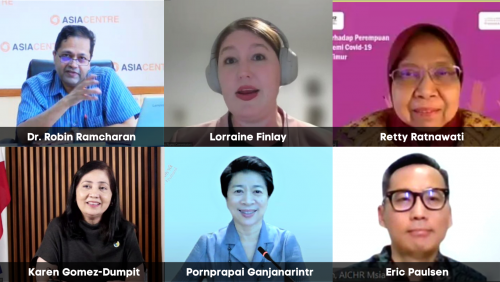
Through the discussions, impact on the rights of women during the pandemic featured prominently. Collectively, the commissioners noted issues of gender-based violence against women during lockdowns, such as increased domestic violence. Worsening the situation was that shelters providing care for victims of violence were forced to shut down, without governments providing alternative primary channels for refuge. Pregnant women faced difficulties accessing health services. The commissioners also pointed out that workers in women-dominated fields continue to be exploited. Further, they highlighted the criminalisation of Human Rights Defenders (HRDs), especially of women HRDs. Indeed, more broadly across the regions, HRDs faced increased prosecution for their criticisms of Governments’ mismanagement of the pandemic.
Children, and youth more broadly, also faced serious challenges with accessing services that address mental health given the deep psychological impact of isolation during lengthy lockdowns. The elderly were also affected in that the pandemic restrictions, including lockdowns, did not properly address their situation and, more generally, the disabled in society. The net effect of the measures to handle the pandemic was to deprive them of critical health and social services.
These challenges have compelled human rights commissions to take actions in protecting human rights. These actions include engaging with governmental agencies to ensure policies are up to human rights standards, providing trustworthy information to the public and continuing to monitor and establish mechanisms to receive complaints of rights violations.
It was noted that the commissions faced significant operational challenges in meeting their mandates, notably investigating complaints, to provide protection services for their constituents. They were also subject to the same lockdown measures and restrictions on assembly.
Finally, attention was called to the work of AICHR, the ASEAN-level human rights body, which has continued to work on human rights issues amidst the pandemic, with its activities and events constrained by the existing framework to promote human rights. Nevertheless, it was able to issue a press statement by Representatives reaffirming the rights of peoples to access quality health-care services and medical facilities – underlining the principle of proportionality in the restriction of human rights during states of emergency.
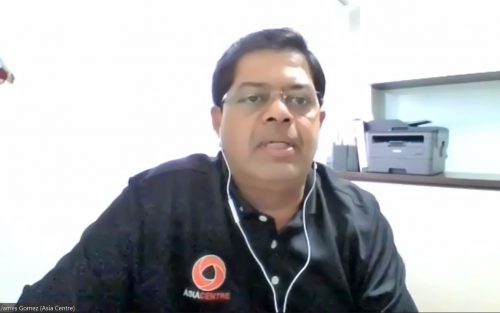
Asia Centre’s Regional Director, Dr. James Gomez, in his vote of thanks, stressed the Centre’s intention to continue tracking the work of regional and national human rights mechanisms. He noted that there is a need to publicise the good work of the commissions as the public is still unclear of what they do and their effectiveness.
The event was co-convened by Asia Centre and the Friedrich Naumann Foundation for Freedom, Thailand. Earlier at the start of the proceedings, tributes were paid to the late Chito Gascon, former Chair of the CHRP who succumbed to COVID-19.
You can view the event’s livestream recording here.
Asia Centre works on issues related to human rights commissions in the region. If you would like to collaborate with the Centre on this and other human rights concerns, send an expression of interest to contact@asiacentre.org.

